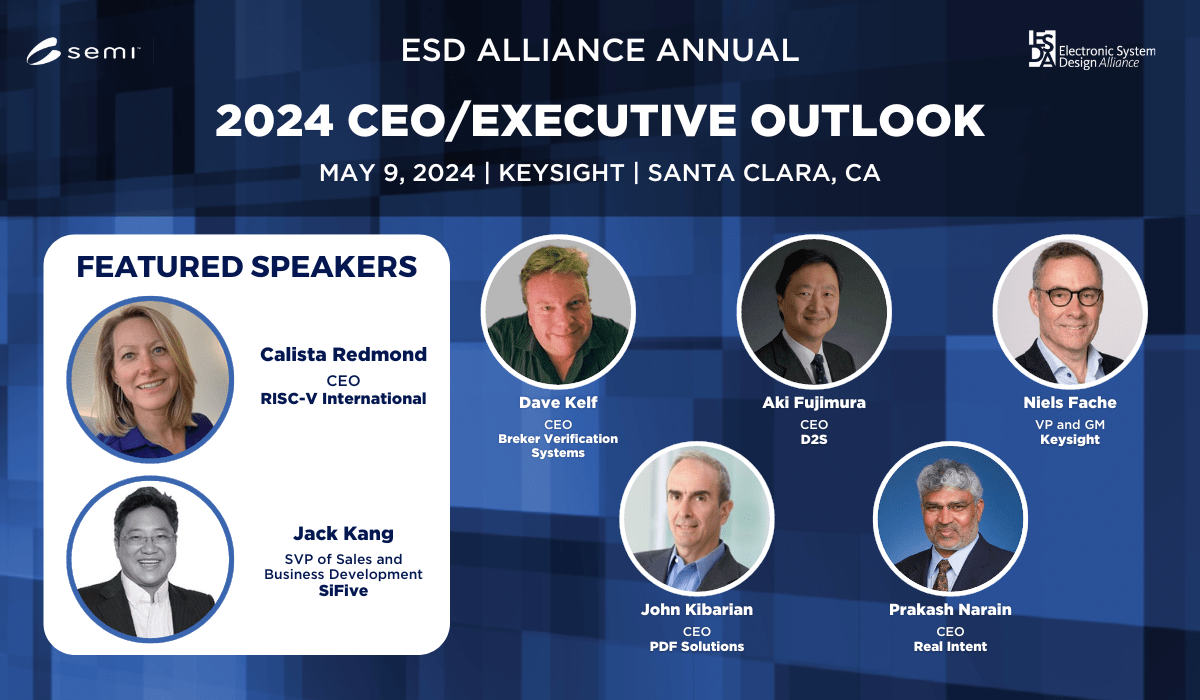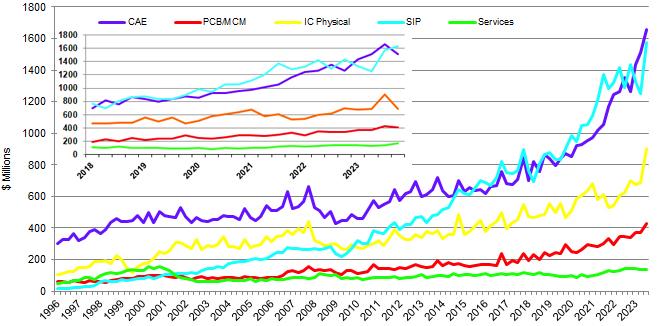
Bridging the Frontier Bob Smith, Executive Director
Bob Smith is Executive Director of the ESD Alliance responsible for its management and operations. Previously, Bob was senior vice president of Marketing and Business Development at Uniquify, responsible for brand development, positioning, strategy and business development activities. Bob began his … More » ESD Alliance Member Companies at DACJune 25th, 2024 by Bob Smith, Executive Director
This week, the 61st Design Automation Conference took over Moscone West in San Francisco. A variety of ESD Alliance member companies were on the exhibit floor with a handsome selection of colorful booths. Nomination Deadline for Phil Kaufman Award and Hall of Fame: June 30June 12th, 2024 by Bob Smith, Executive Director
A reminder that nominations are being accepted now through June 30 for the 2024 Phil Kaufman Award and the Phil Kaufman Hall of Fame co-sponsored by the ESD Alliance and the IEEE Council on Electronic Design Automation (CEDA). The awards, determined by a committee of volunteers from both organizations, recognize individuals whose contributions made an impact within electronic system design in business, industry direction, promotion, technology and engineering, educational or mentoring. The Phil Kaufman Award honors EDA pioneer Phil Kaufman who turned innovative technologies such as silicon compilation and emulation into businesses that have benefited electronic designers. The Phil Kaufman Hall of Fame posthumously recognizes individuals who made significant and noteworthy contributions through creativity, entrepreneurism and innovation to the electronic system design industry and were not recipients of the Phil Kaufman Award. Nomination forms are found on the ESD Alliance website. Read the rest of Nomination Deadline for Phil Kaufman Award and Hall of Fame: June 30 Playing Catch with Robots at SEMI’s ASMC 2024June 5th, 2024 by Paul Cohen
The Electronic Systems Design (ESD) Alliance is part of SEMI, a large and diverse industry association of companies in the electronics design and manufacturing supply chain noted for its many yearly events. One is the Advanced Semiconductor Manufacturing Conference (ASMC), held May 14-16 this year in the Hilton Hotel, a new venue for the conference in Albany, NY. ASMC continued the tradition of excellent technical presentations on a variety of topics related to semiconductor manufacturing. Sessions covered Yield Enhancement; Advanced Metrology; Advanced Equipment, Processes and Materials; Manufacturing for Sustainability; Defect Inspection; Equipment Optimization; Advanced Process Control; Smart Manufacturing; Contamination Free Manufacturing; Big Data Management and Mining; and 3D through silicon via (TSV) and Novel Advanced Silicon Processing. While attendees came from around the world for the technical content, the event included opportunities for networking and a little bit of fun. A highlight was a lunchtime robotics demonstration from FIRST Team 20, the Rocketeers from Shenendehowa High School in nearby Clifton Park, NY. A founding team in the FIRSTⓡ Robotics Program, it has competed in robotics competitions since 1992 helping students to develop both content and soft skills that are transferable to college and career. And over the years, the team has adapted nimbly to the ever-changing technology landscape. The team currently consists of more than 100 passionate high school students and recently competed at the regional level at the New York Tech Valley Regional Robotics Competition and the Hudson Valley Regional Robotics Competition. Although the competitions include robots from multiple teams competing on the court simultaneously, the ASMC demo sponsored by TEL was somewhat simpler. At lunch on day two of ASMC, the students brought a robot to play catch using foam rings. Under the control of the students, the robot traveled to a ring and picked it up from the floor, then tossed it toward the students and conference attendees, who would then toss it back toward the robot and the process repeated. The students could easily control the robot to pick up each ring, then adjust the vertical angle of the ring toss. Although the demo is simpler than the actual competition, it provided the team an opportunity to interact with sponsors and leaders in the semiconductor technology community. It was clear during the demo that the students enjoyed the opportunity to demonstrate their robot and share their passion for FIRST. To learn more about SEMI’s other programs or the FIRST Robots Program, contact me at pcohen@semi.org. Engage with the ESD Alliance ESD Alliance Bridging the Frontier blog Twitter: @ESDAlliance Highlighting ESD Alliance Member CompaniesMay 30th, 2024 by Bob Smith, Executive Director
The ESD Alliance, a SEMI Technology Community, has a vibrant community of design tools companies and IP providers, all with great stories. Over the last few years, we worked with many of them to produce a collection of posts published on the SEMI website blog. For the first time, we compiled the posts from 2023 and 1H 2024 … in case you missed any. Please enjoy them and consider working with us on a Q&A interview if your company hasn’t been part of this benefit program yet, one of many we offer members. If your company isn’t a member, consider joining to take advantage of them. Contact me at bsmith@semi.org or Nanette Collins who is manages our Public Relations efforts at nanette@nvc.com. Keysight: Zeroing in on EDA Tool Interoperability With Keysight EDA February 13, 2023 Qualcomm: Speeding the Path to Industry Standardization with Accellera May 1, 2023 Silvaco: Applying AI in Fab Technology Co-Optimization June 12, 2023 Ansys: It Will Take a Village to Solve Multiphysics July 5, 2023 CEMWorks: Driving Smart City, Transportation and Communications Innovations Through Electromagnetic Simulation August 1, 2023 Atomera: Boosting Semiconductor Performance With Quantum-Engineered Materials Oct 9 2023 Real Intent: Growing Into a Management Role: Perspectives From Real Intent CEO Prakash Narain November 27, 2023 D2S: CEO Aki Fujimura: Curvy Design’s Time Has Come February 5, 2024 Sigasi: Getting it Right the First Time With Sigasi February 20, 2024 IC Manage: Improving Chip Design and Verification Efficiency with IC Manage April 15, 2024 About the ESD Alliance The ESD Alliance, a SEMI Technology Community, has other programs, initiatives and activities for our members driven by engaged volunteers that bring value to our entire industry:
Engage with the ESD Alliance ESD Alliance Bridging the Frontier blog Twitter: @ESDAlliance Real Intent’s Prakash Narain on Growing into Management RoleMay 23rd, 2024 by Bob Smith, Executive Director
 Prakash Narain, a founder of Real Intent who serves as its president and CEO, grew his skillset from EDA tool developer to senior executive. In our recent conversation, he describes how his thirst to build a company led to the founding of Real Intent 25 years ago. He also offers advice on how to move into management or entrepreneurism and we conclude our talk with his opinion of recent industry trends. Smith: How did your career journey get you into the business world and on to becoming the leader of Real Intent? Narain: My background is in engineering; I received my Ph.D. from the University of Illinois at Champaign-Urbana. I first worked in EDA tool development at IBM EDA, CAD flow development at AMD, then moved on to semiconductor design at Sun Microsystems. I always had a thirst to build a company to solve problems and improve the status quo. Over time, I decided it was important to address the verification challenges that our industry faced. That led to the founding of Real Intent 25 years ago, back in 1998. Initially our target technology was in formal verification; however, we were way ahead of our time, as there was not even an assertion standard available.
My background when we first founded Real Intent was all based in engineering and I didn’t have much management experience. Building a successful company requires a more diverse set of skills. I had to develop these along the way by learning how to manage people and products, as well as administration, business management, marketing, and sales. Real Intent is profitable and doing very well today. We have a strong, expanding product portfolio, a collaborative organization, and an engaged customer base. Smith: How do you perceive leadership? Narain: Leadership to me is about how you get things done – how you facilitate change. Significant achievements require a group effort. As a leader, you must motivate people and create an environment where large groups of people can work cooperatively and excel. That environment needs to be weaved together in a way that enables everyone to grow within their domain of competency, so that as a group the team can accomplish something significant.
This leadership style of empowering people has worked very well for me. Leadership and entrepreneurship require creativity to imagine new ways to create value for a product and its applications, as well as in setting goals and communicating in a way that inspires people. Smith: How has your engineering background helped inform your leadership style? Narain: Electronic design automation is a very engineering heavy industry. Having the relevant engineering domain knowledge and expertise is essential to operating as a leader in comprehending the technology challenges you face and making the right judgment calls. This engineering domain expertise also allows you to effectively communicate with the people you lead as well as promote the value of your company and its products to your customers and the industry. Smith: What advice would you give to someone wanting to grow into a management role or to budding entrepreneurs? Narain: My advice to engineers wanting to transition to become budding entrepreneurs is: Do not take entrepreneurship lightly – it’s hard. Be aware that it requires a lot of personal grit to come out on the other side to run a successful, profitable company.
Everyone will have a different balance of these three attributes, and my advice would be to know your own strengths and work to develop your management style in all three dimensions. Smith: What’s on your mind these days? What trends are you seeing? Narain: Across the tech industry, we see this massive trend toward the development and deployment of artificial intelligence and machine learning. The important question is – can we leverage AI techniques to advance the engineering domains in which we operate. At Real intent, we are focused on enabling shift left with static sign-off. I also see tremendous opportunity in the static sign-off domain to continue to advance and expand through new applications for enabling shift left in verification for various design flow aspects. Shift left can be defined as the earliest possible efficient verification of a design step. About Prakash Narain Dr. Prakash Narain is President and CEO of Real Intent. His career spans IBM, AMD and Sun where he had hands on experience with all aspects of IC design, CAD tools design and methodology. He was the project leader for test and verification for UltraSPARC III at Sun Microsystems. He was an architect of the Mercury Design System at AMD. He has architected and developed CAD tools for test and verification for IBM EDA. Dr. Narain has a Ph.D. from the University of Illinois at Champaign-Urbana where his thesis focus was on algorithms for high level testing and verification. Ansys’ John Lee on Cultivating Trust within his TeamMay 9th, 2024 by Bob Smith, Executive Director
 Note: Bob Smith’s interview below with John Lee of Ansys originally appeared March 4, 2024 on the SEMI website blog. Cultivating trust and keeping his team agile and innovative as they engage with technology partners and customers is a core focus of John Lee, General Manager and Vice President of the Ansys Electronics, Semiconductors, and Optics Business Unit. I recently spoke with Lee, a serial entrepreneur and a member of the ESD Alliance Governing Council, about his career and move from technical roles into management and how he motivates members of his team. Read the rest of Ansys’ John Lee on Cultivating Trust within his Team CEO Executive Outlook Last Call, Spotlight on ESD Alliance VolunteersMay 2nd, 2024 by Paul Cohen
Kudos to Scott Sieden, Keysight’s Director Strategic Marketing, Keysight EDA Portfolio, and a tireless ESD Alliance volunteer, for his efforts to ensure a lively CEO Executive Outlook next Thursday, May 9. A highlight of the evening are two RISC-V influencers who will discuss the RISC-V movement and its effect on the semiconductor design ecosystem –– Calista Redmond, CEO of RISC-V International, and Jack Kang, Senior Vice President of Business Development at SiFive. Bob Smith, the ESD Alliance’s Executive Director, will moderate a panel of executives reviewing the state of the electronic system design industry now and in the future:
Read the rest of CEO Executive Outlook Last Call, Spotlight on ESD Alliance Volunteers Curvy Design’s Time Has Come Says D2S CEO Aki FujimuraApril 23rd, 2024 by Bob Smith, Executive Director
Aki Fujimura, CEO of D2S and a member of the ESD Alliance Governing Council, is an expert on curvilinear (aka curvy) chip design. He believes curvy chip design’s time has come and will ultimately replace the traditional Manhattan routing methods with their 90-degree-constrained turns. He recently discussed with me why curvy designs will lead to smaller, faster and more power efficient devices. Smith: As the original creator of DEF/LEF as VP Engineering of Tangent in the late 1980s, you are very familiar with Manhattan routing methods. Tangent was first to commercialize area-based placement and routing with DEF, LEF, engineering change order (ECO), clock tree synthesis, scan insertion, timing-driven design in a then-solidifying synchronous design methodology. Tangent was acquired by Cadence in 1989 as a result. DEF/LEF are still the standard formats today for place and route. Isn’t the whole EDA infrastructure still pretty much making the Manhattan assumption? Fujimura: A huge amount of innovation since then has improved considerably upon what we did back then. But you’re right that the basic approach to place and route is still making the Manhattan assumption with an alternating preferred direction (either horizontal or vertical) per layer. The Manhattan assumption was already there before Tangent came along. But prior to DEF/LEF, all interconnect was described as a path with (x,y) of each vertex. DEF/LEF halved the file sizes through the simple assumption that X or Y repeat because 99% of wires are alternatingly horizontal and vertical. Read the rest of Curvy Design’s Time Has Come Says D2S CEO Aki Fujimura Great Lineup of Speakers Highlights CEO Executive Outlook May 9 at KeysightApril 17th, 2024 by Bob Smith, Executive Director
Registration may still be open for the ESD Alliance CEO Executive Outlook co-hosted with Keysight Technologies Thursday, May 9, but I suggest you sign up now. With a great lineup of speakers and topical discussions, we’re expecting a crowd. We have a slight change in speakers. Jack Kang, Senior Vice President of Sales and Business Development at SiFive, joins Calista Redmond, CEO of RISC-V International, to talk about the evolving RISC-V movement and its effect on the semiconductor design ecosystem. Read the rest of Great Lineup of Speakers Highlights CEO Executive Outlook May 9 at Keysight Electronic System Design Industry Logs $4.4 Billion in Revenue in Q4 2023April 9th, 2024 by Paul Cohen
Kudos all around our industry as it continues to report strong revenue growth! According to the Electronic Design Market Data (EDMD) report, the Electronic System Design (ESD) industry revenue increased 14% to $4,423 million in the fourth quarter of 2023 from the $3,879.9 million logged in the third quarter of 2023. The four-quarter moving average comparing the most recent four quarters to the prior four increased 14.1%. Our industry’s hiring. Companies tracked employed 60,106 people globally in Q4 2023, an 8.9% jump over the Q4 2022 headcount of 55,192 and up 0.6% compared to Q3 2023. Read the rest of Electronic System Design Industry Logs $4.4 Billion in Revenue in Q4 2023 |
|
|
|||||
|
|
|||||
|
|||||


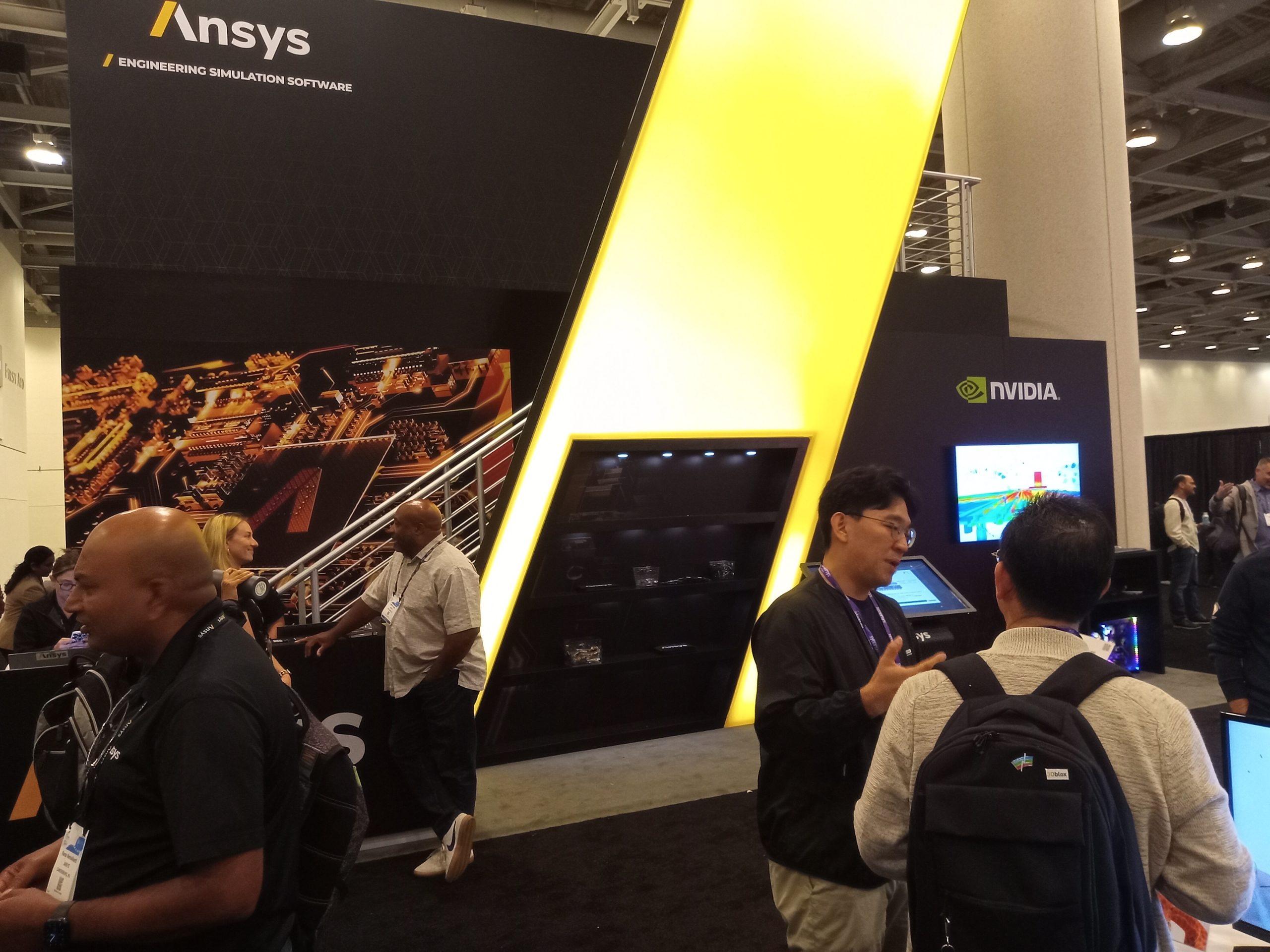

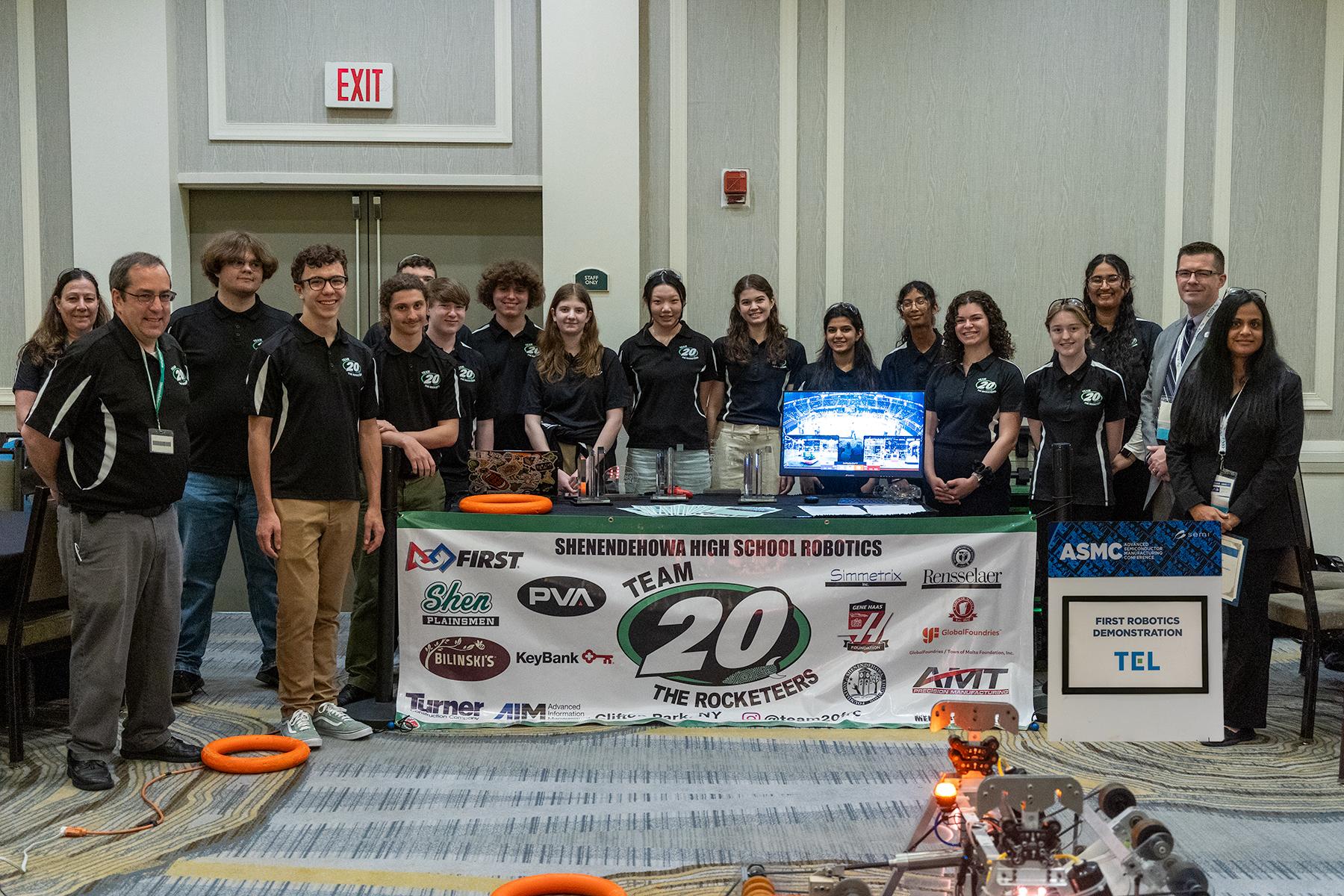
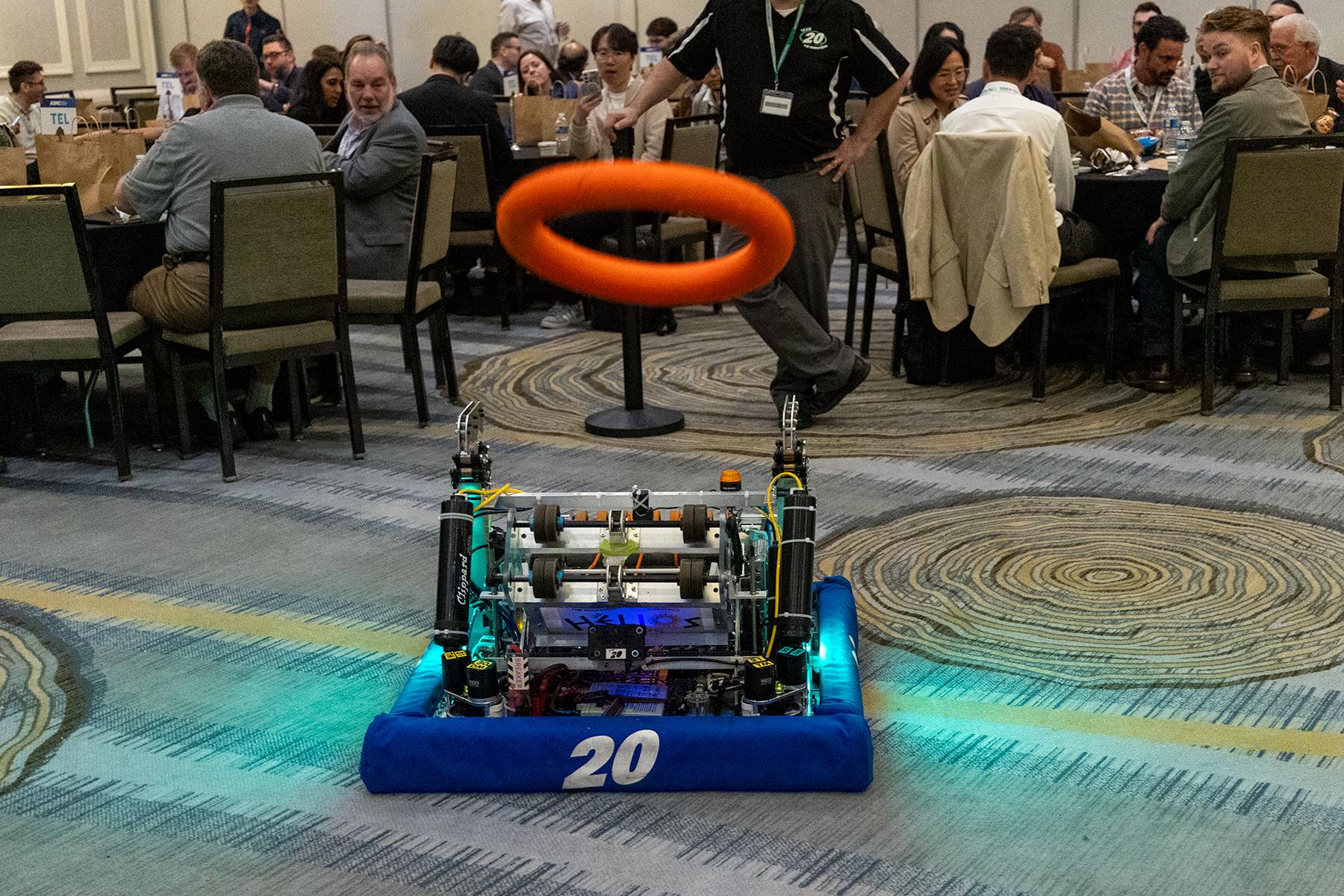
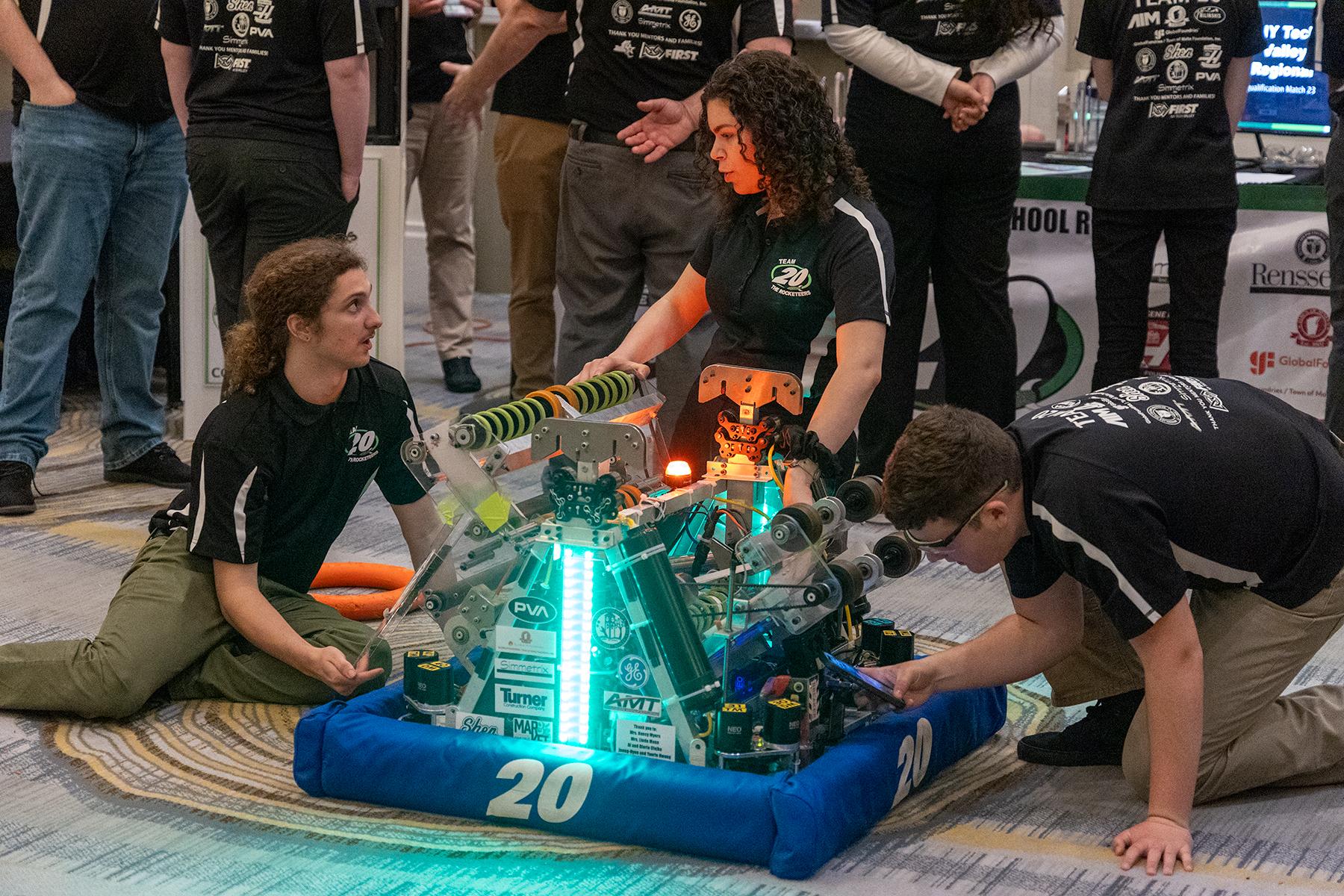
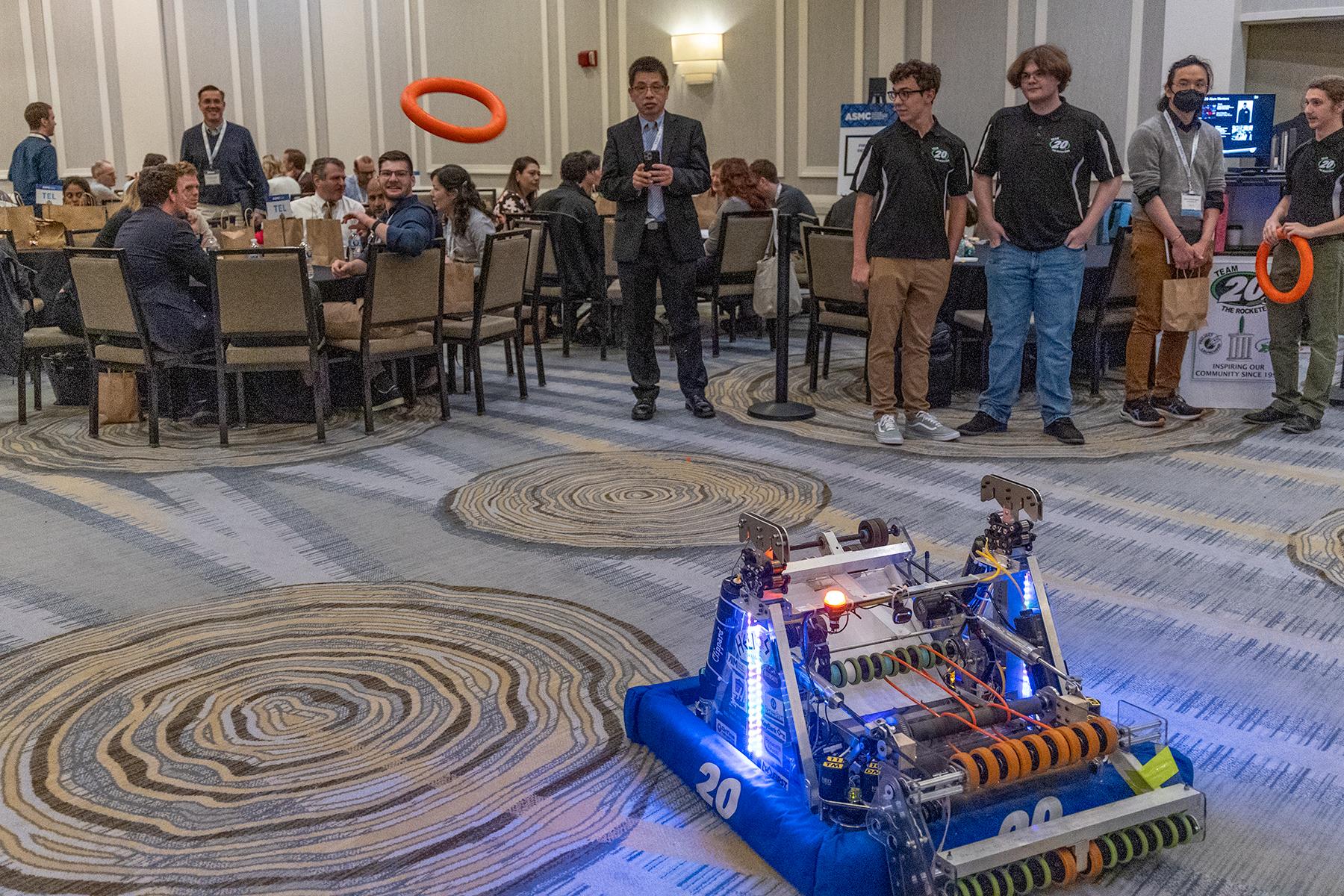
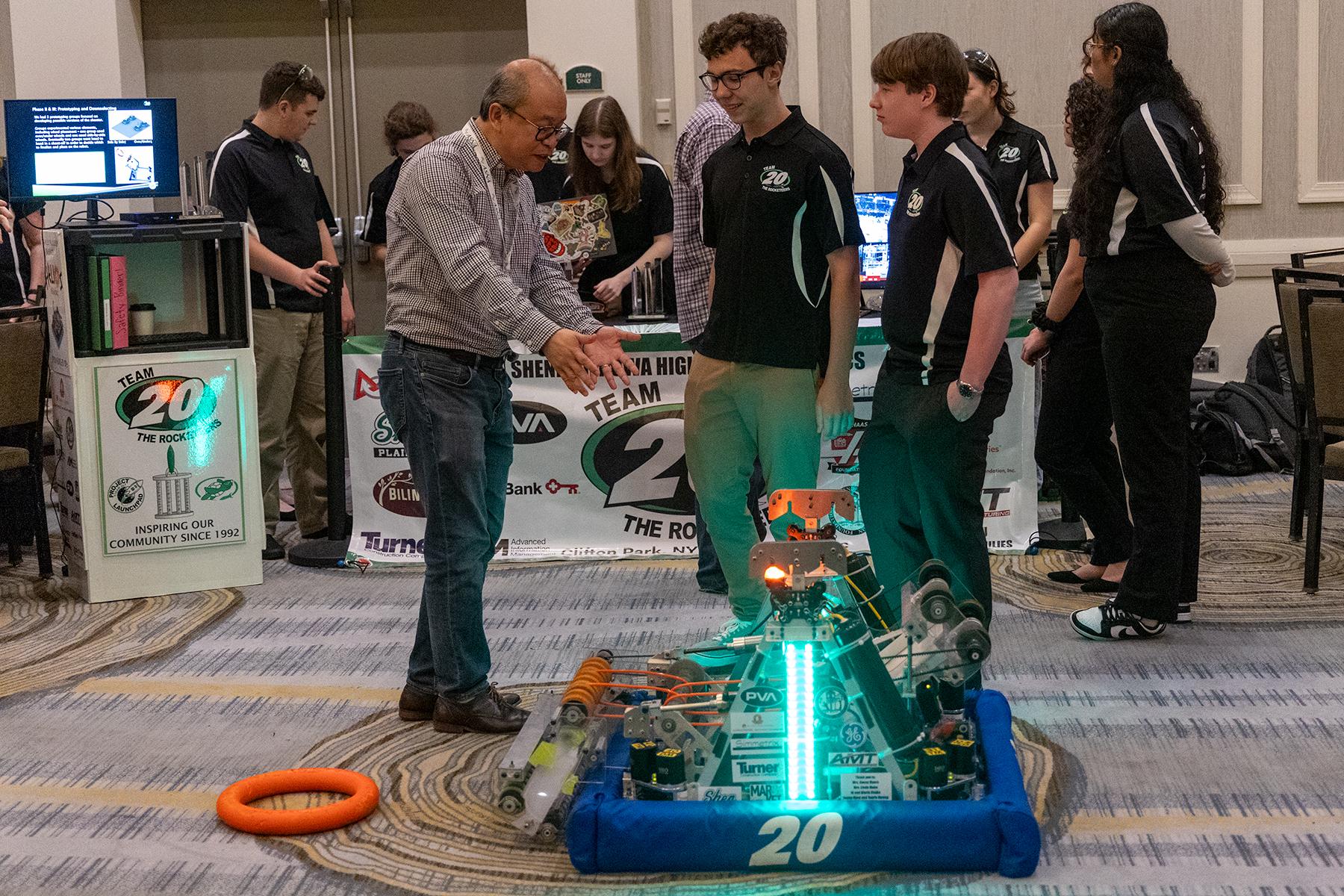

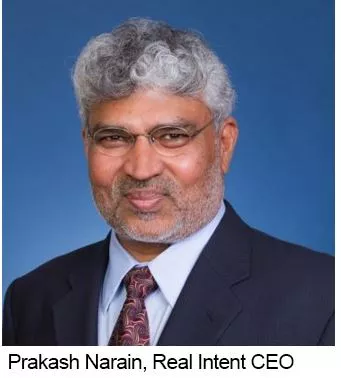 We successfully worked through the System-Verilog standardization process – yet in the end, we recognized that there was a bigger need for a higher capacity, higher performance verification solution. So, we pivoted and invented an approach that we term functional static sign-off.
We successfully worked through the System-Verilog standardization process – yet in the end, we recognized that there was a bigger need for a higher capacity, higher performance verification solution. So, we pivoted and invented an approach that we term functional static sign-off. There are leaders who may look to control and leave their imprint on everything. However, when you hire very good people and want them to make significant contributions, you must be able to delegate to them – and accept that you will have near-term dependencies on them.
There are leaders who may look to control and leave their imprint on everything. However, when you hire very good people and want them to make significant contributions, you must be able to delegate to them – and accept that you will have near-term dependencies on them. For engineers wanting to grow into a management role, I would simplify management into three dimensions – people managers, process managers, and engineering managers.
For engineers wanting to grow into a management role, I would simplify management into three dimensions – people managers, process managers, and engineering managers.
